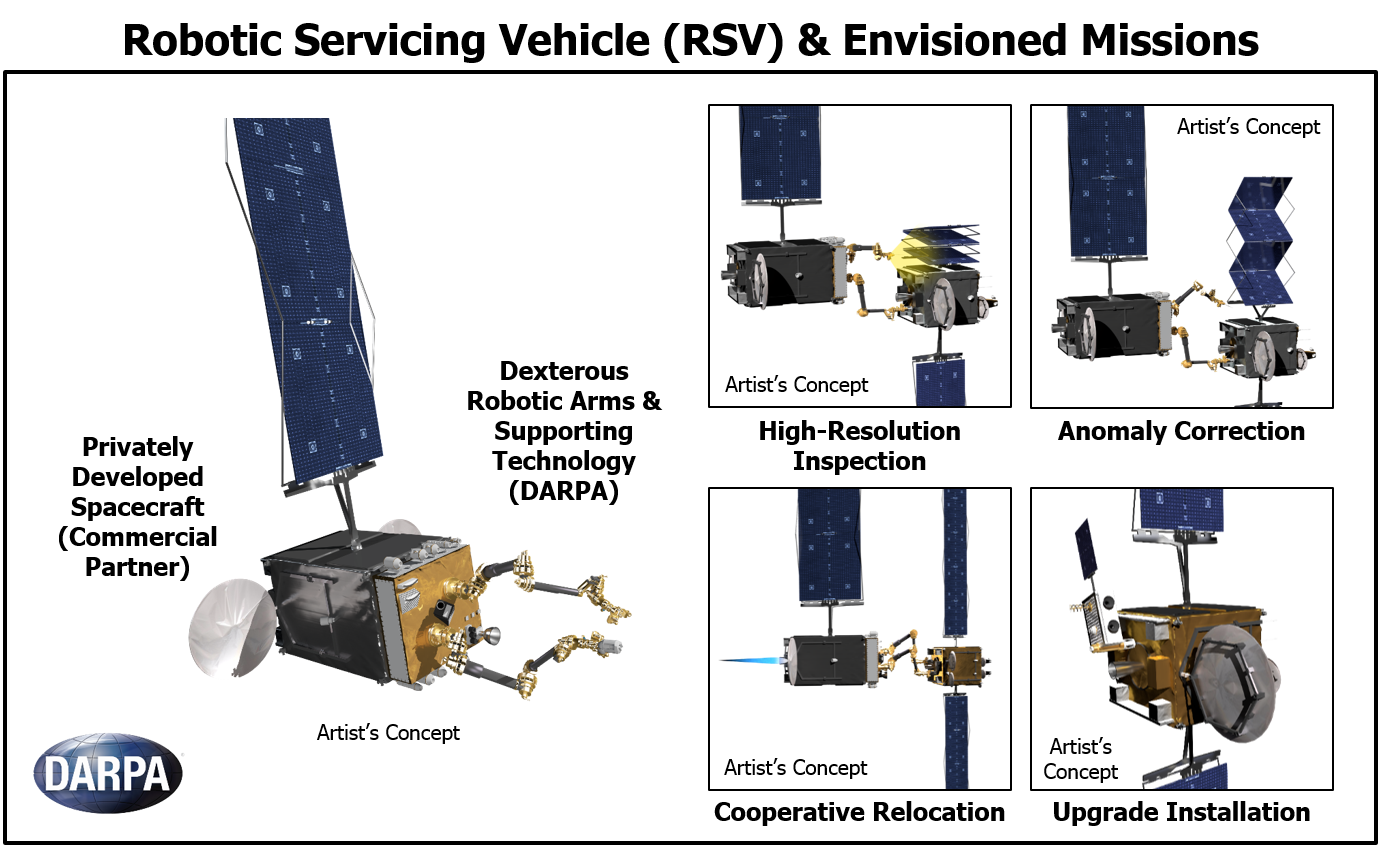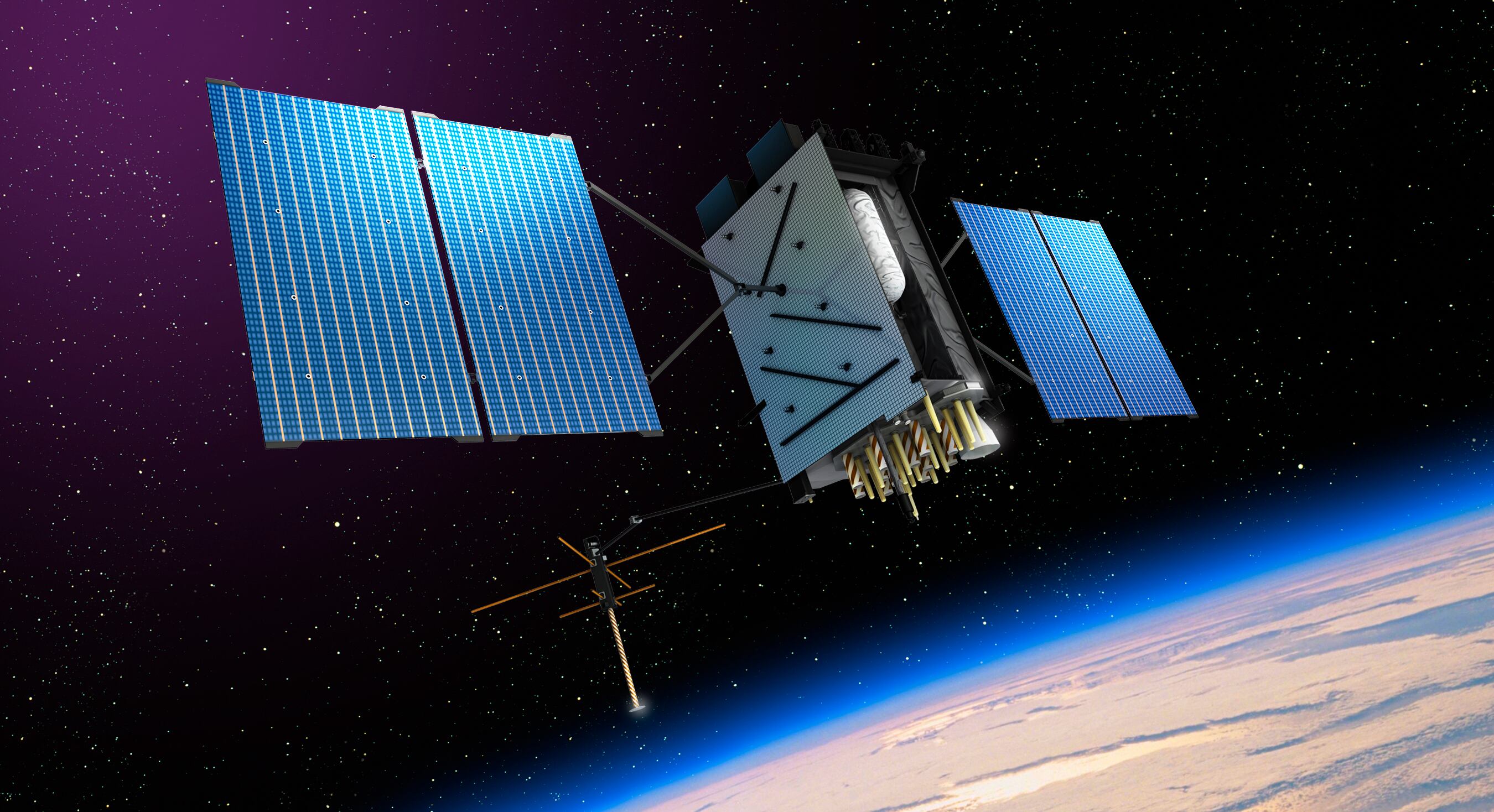WASHINGTON — As the Senate takes up the defense bill this week, two proposed amendments could change the scope of a DARPA satellite-servicing program that a competing company says undercuts the commercial market.
Earlier this year, the Defense Advanced Research Projects Agency awarded a contract to Space Systems Loral for the Robotic Servicing of Geosynchronous Satellites program. Through the RSGS program, DARPA and SSL hope to develop a robot capable of moving geosynchronous satellites in orbit about 20,000 miles from the Earth, making basic repairs and installing upgrades.
However, Orbital ATK contends that its own product, the Mission Extension Vehicle, or MEV, is being built for the same types of tasks, and that DARPA’s partnership with SSL violates National Space Policy because it subsidizes a vendor in a market space where companies are independently developing commercial technologies.
Orbital claims it has already spent close to $200 million developing the MEV and booked its first customer, Intelsat, for a launch in 2018. However, it could see that competitive edge taper away if DARPA goes through with the program as it is currently structured, said Ed Fortunato, Orbital’s senior vice president for government relations.
However, Mike Gold, SSL’s vice president for Washington operations, told Defense News on Wednesday that SSL is putting more than $200 million of its own capital at risk on RSGS, making the playing field even.
After DARPA and SSL demonstrate RSGS, the agency plans to hand the spacecraft back to the company. Under the terms of the private-public partnership with DARPA, the government will then be able to purchase satellite repair services from SSL at a discount, while the company would be able to seek commercial customers.
RELATED

At that point, SSL might be able to undercut Orbital’s position in the market because the RSGS spacecraft was developed with government funds, meaning that it can sell the same services at a cheaper price while still being profitable, Fortunato said.
“To transfer it to a commercial firm with the intent and purpose to allow them to garner revenue by entering into this emerging market is quite simply not fair,” he told Defense News on Sept. 12. “If another company wants to do what Orbital ATK did and put their capital at risk and build a system and get customers and have a business case and launch it, well, that’s called capitalism. That’s what we do.”
However, as the Senate debates the defense authorization bill this week, two lawmakers have offered amendments that would curb the RSGS program by putting limitations on when and how SSL would be able to use the spacecraft.
The first, offered by Oklahoma Republican Sen. Jim Inhofe, would prohibit DARPA from handing over the satellite-servicing robot to a private company after the demonstration program is over — curbing SSL’s ability to use the technology in the commercial marketplace. This amendment would allow the government to use the RSGS spacecraft to repair its own satellites only if the defense secretary determines that is more cost-effective than existing commercial options.
A second amendment, from Sen. Orrin Hatch, R-Utah, is slightly less restrictive. If adopted, it would mandate that the defense secretary sign off on commercial uses of the RSGS spacecraft. It also calls for DARPA to submit updates about the cost and technological progress to the U.S. comptroller.
Requests for comment were not returned by Inhofe and Hatch’s offices by press time.
As of Wednesday, it’s unknown exactly which amendments to the defense bill will be debated on the Senate floor. With more than 500 amendments submitted so far, there is a distinct possibility that neither Hatch’s nor Inhofe’s amendment will ever move to a vote.
Gold said SSL is confident the Hatch and Inhofe amendments will not be approved by the Senate.
“We have great faith that the U.S. Senate will join the Trump Administration, the House Defense Appropriations Subcommittee, and the House Armed Services Committee in supporting the RSGS program and rejecting amendments that would interfere with the independence and integrity of DARPA’s procurement process and the deployment of a sophisticated robotic system to protect American satellites,” he wrote in an emailed statement to Defense News.
“If the Congress stepped in to prevent the development of a capability every time a rival company claimed to be funding or building an alternative, and in this case a completely different capability, we would have no government programs or public-private partnerships,” Gold added.
If adopted, the language could help to course correct a market that is already becoming “distorted,” said Fortunato, who says potential MEV customers are waiting to see whether SSL will be able to offer a comparable product at a lower price.
“As we’re trying to secure long-term contracts, it’s difficult to do when your competitor can come in and say: ‘Well, I can do this cheaper because I’ve been subsidized with U.S. taxpayer dollars, so don’t sign a long-term agreement,’” he said.
However, even if the language is passed, it will have to survive conference, where the House and Senate work out differences in their legislation. That period of time could give DARPA and SSL the opportunity to step in and make their case to lawmakers.
RELATED

Tension between DARPA and Orbital ATK have exploded over the past several months as a result of ongoing disputes about the RSGS program. Earlier this year, Orbital filed a lawsuit against DARPA through the U.S. District Court for the Easter District of Virginia, which was dismissed in July.
However, Fortunato said the company’s goal is to change the structure of the RSGS program, not cancel it altogether.
DARPA declined to comment on this story, but has maintained that the capabilities of its RSGS spacecraft and Orbital’s MEV are different, with the MEV only able to move satellites, not inspect or repair them.
Gold made similar arguments when contacted by Defense News on Wednesday.
“DARPA conducted a full, fair, and open competition for RSGS, and it’s unfortunate that there is still any debate, particularly since the ability of the RSGS Robotic Servicing Vehicle to refuel, repair, and replace damaged components on satellites is dramatically different from what is being proposed with the MEV,” he said.
Orbital has said it is taking an iterative approach with MEV, and that future vehicles will be able to attach new payloads and do simple maintenance like removing stuck satellite appendages.
Despite the murky future for the MEV, work on the first spacecraft, MEV-1, is ongoing. On Monday, the company announced that assembly had begun at its facilities in Dulles, Virginia, and that more than 75 percent of the components had been delivered by suppliers.
Updated on 9/13/17 at 7:15 p.m. EST with comment from SSL.
Valerie Insinna is Defense News' air warfare reporter. She previously worked the Navy/congressional beats for Defense Daily, which followed almost three years as a staff writer for National Defense Magazine. Prior to that, she worked as an editorial assistant for the Tokyo Shimbun’s Washington bureau.








